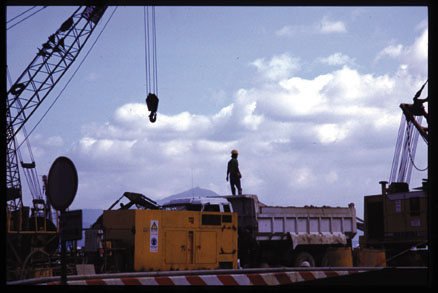



Official pleas
Labour Department says it made efforts
By Apple Fu
 Following up the “No easy money” story published in the February issue, Varsity staff writer Apple Fu has communicated the problems faced by Ah-kin and his colleagues to the Labour Department to get the official responses. The following story gives a brief review of the degree of the protection of rights of imported labourers under present legislation.
Efforts were made to make contact with the responsible Mainland employment agencies involved in the complaints, but these attempts were unsuccessful.
Following up the “No easy money” story published in the February issue, Varsity staff writer Apple Fu has communicated the problems faced by Ah-kin and his colleagues to the Labour Department to get the official responses. The following story gives a brief review of the degree of the protection of rights of imported labourers under present legislation.
Efforts were made to make contact with the responsible Mainland employment agencies involved in the complaints, but these attempts were unsuccessful.In November 1995, according to the Labour Department, a total of 1,455 complaints concerning salary payments being withheld illegally were recorded. Of these, 500 came from Mainland labourers working on the Chek Lap Kok airport project, and another 495 from workers at the Tsing Yi airport railway site.
Imported workers at the airport railway site on Lantau Island said they had received only 10 percent of their salaries, or about $1,000 a month.
Some Thai workers on the Central reclamation site were asked to sign a second contract in which they were made to accept thousands of dollars less than the contracts they saw at home.
In response to this, Mr. Alfred Chan Wing Kit, the assistant commissioner for labour of the Labour Department, said, “It is an offence to provide false information to the Immigration Department or to have two sets of contracts of double standards.”
He said that prosecution of employers who breach the law will result in a fine of $100,000 plus a one-year imprisonment and a ban from the labour importation scheme.
The department holds briefing sessions to publicize the rights of imported workers. Leaflets and reference cards have been distributed to the workers.
Many Chinese labourers said that they were cheated by the job placement agencies in China. They paid large amounts so as to gain access to Hong Kong.
They claimed they had to pay 35 to 55 percent of their wages to the agency. After arrival, they were asked to surrender their passports and to sign an agreement to transfer a certain amount of their payments to the agency, they said.
Furthermore, the present regulations in Hong Kong allow employers to take a quarter of workers’ salaries for accommodations and food expenses. Meanwhile, according to the Chinese law, up to 25 percent of wage deductions can be made to pay workers’ families and former employers on the Mainland.
According to the Commissioner for Labour, Mr. Ip Shu Kwan, the Labour Department has suggested some solutions to solve the above problems.
Employers have to hand in records of the automatic account transfer to the department. Workers have the right to keep copies of their contracts, and signatures would be asked for confirming the contracts.
As some imported labourers were reported not being assigned the applied jobs, and because there were missing workers who were suspected of having taken illegal employment elsewhere, unions criticized the ineffectiveness of the monitoring system.
The department responded that officials are sent to inspect the construction sites. In 1995, more than 4,000 such inspections were made.
A temporary office has recently been set up at Chek Lap Kok to help workers file complaints and to monitor the implementation of regulations.
The Labour Department also received information from workers that some employers were involved in accepting commissions from Mainland labour agencies.
“We will get the Independent Commission Against Corruption and Commercial Crime to investigate the issue,” Mr. Ip said.
Furthermore, many Mainland workers were sacked after their strike and complaints, even though their contracts were not due to expire.
However, if it wer done with no violation of the provisions as stated in the Employment Ordinance, the department cannot charge the employers.
Mr. Ip said agreements reached in China between employment agencies and workers were beyond the jurisdiction of local legislation, so the government has no power to intervene in the issue.


